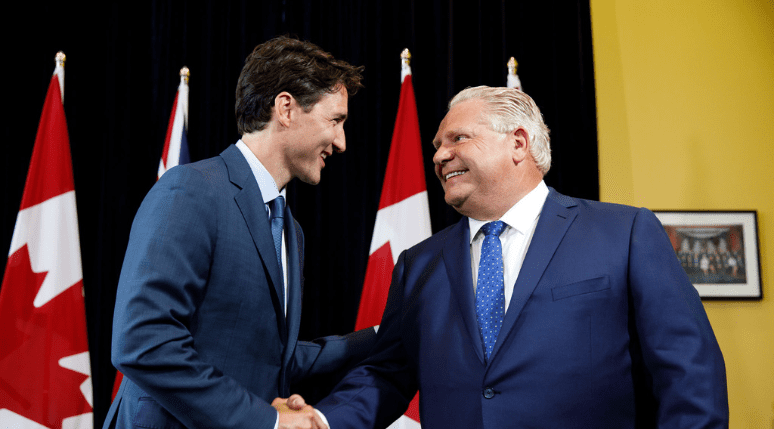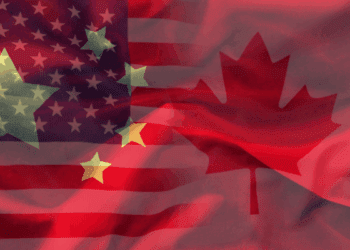This article originally appeared in the Hub.
By Aaron Wudrick, April 26, 2024
The saga of Bombardier, once a symbol of Canadian pride, is a sobering one. Joseph-Armand Bombardier, who founded the company in 1942, was a great Canadian inventor and entrepreneur. But over time, the company that bears his name morphed into the poster child for corporate welfare in Canada, becoming utterly dependent on using its outsized political clout to browbeat successive governments into funneling them perpetual taxpayer largesse. The results have cost Canadians more than $4 billion in direct costs alone; distorted and disfigured our economy at the expense of other sectors not so favoured; and sowed unhelpful regional divisions to boot.
Unfortunately for Canadians, Prime Minister Justin Trudeau and Ontario Premier Doug Ford don’t see the Bombardier trainwreck as a cautionary tale. They see it as a blueprint, to be repeated on an even bigger scale—this time for electric vehicles (EVs)—and even more alarmingly they’re super-sizing the subsidies.
The latest installment of taxpayer lolly came this week, in the form of $5 billion worth of direct subsidies and tax credits for Honda (2023 global profit: $8 billion USD) to retool its existing Alliston, Ontario plant to build EVs. This comes on the heels of other government “investments”—always the euphemism of choice in polite company—to the tune of $28 billion for Stellantis and Volkswagen’s EV battery plants in Windsor and St. Thomas, Ontario.
What will taxpayers get for the new $5 billion contribution? The press release touts the creation of 1000 “new” jobs—clearly a bargain at just $5 million apiece—which will more than likely not even be new at all, but merely shifted away from other, unsubsidized sectors and businesses. This is “on top of retaining the existing 4,200 jobs at the assembly plant” which awkwardly (but accurately) makes it sound more like a ransom fee than an exciting new partnership.
Then there are the much-vaunted “spinoff effects,” the arithmetic reliability of which always falls somewhere between random numbers picked out of a hat and yanking a lever on a slot machine. What about supporting an EV supply chain? Once again the Bombardier example is instructive. Far from supporting an entire ecosystem, taxpayers were still forced to prop up its suppliers; bankroll Bombardier-led research; swallow debts for distressed assets the company scooped up at bargain basement prices; and backstop cheap loans for clients.
Lo and behold, we see the same story now playing out with EVs. There’s the aforementioned $28 billion for EV batteries. There are fat demand-side subsidies for well-to-do buyers. Does anyone doubt for a millisecond that it’s only a matter of time before another player in the EV ecosystem chain squawks for help—and that the moment they do, Ford and Trudeau will be there in jiffy, press corps and ribbons in tow, grinning for the cameras as they mainline a fresh infusion of taxpayer cash to the latest lucky recipient?
Just as it was for aerospace, the government’s “plan” for EVs is nothing more than a massive gamble with other people’s money, informed not by sound economics or superior market insight but by enormously perverse political incentives. Ribbon cuttings are highly visible. Opportunity costs are not. “New jobs created” sounds great; “jobs that would have otherwise been created but for resources being diverted away” is cumbersome and hard to prove. The political benefit of announcing “investments” accrues today, or at least in time for the next election. The political consequences of failure—if any—lie many years into the future, long after the culprits will have left public life.
Perhaps most troubling for Canadians is that there seem to be fewer and fewer political voices willing to criticize this type of tried-and-failed industrial strategy. Historically, New Democrats had been vocal opponents of “corporate welfare bums”—a term coined by former NDP Leader David Lewis in 1972. Similarly, conservatives—ostensibly the keepers of the free-market flame—have at least opposed corporate welfare while in opposition if not while in office. Perhaps this explains Doug Ford’s comfort in executing such a blatant flip-flop having once campaigned on ending corporate welfare, even going so far as to say it’s not fair that some companies get grants or loans from taxpayers while others don’t. But even predictable political expediency aside, there is a misguided strain on the Right that seems to have developed a sudden and inexplicable faith in government’s ability to plan economies—one that seems every bit as enthusiastic as traditional socialists or social democrats.
Bombardier represents the most calamitous example in a real-world track record of industrial policy that suggests we need more, not less, skepticism about government’s ability to successfully pick winners and losers. Barring the emergence of more robust defenders of a market-led approach, the likes of Trudeau and Ford look set to lead Canadians down the road to another eye-watering economic travesty.
Aaron Wudrick is the domestic policy director at the Macdonald-Laurier Institute.






